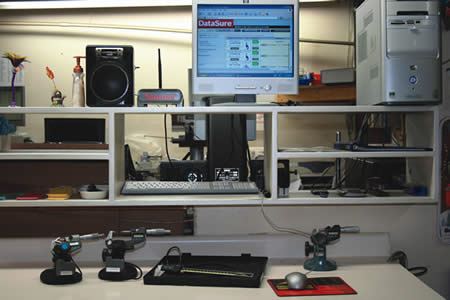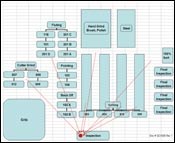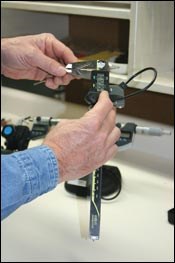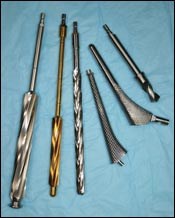Wireless Data Collection Readies Surgical Toolmaker For Full SPC
This surgical tool manufacturer strove to ensure part quality with stringent inspections, but its manual data-entry process and hardwired measurement tools limited productivity. After purchasing a radio-based wireless data collection system, the shop witnessed a 25-percent reduction in its inspection process.
Share





Producing parts with complex, intricate geometries can be a challenge for any shop, but in the medical field, this is routine. With little room for error, medical manufacturers machining high-precision components that require tight tolerances need reliable quality control systems to ensure their products meet specification. However, without an efficient means of collecting and storing measurement data, quality control can become a vexing bottleneck that adversely affects the entire operation.
Quality control inspectors at surgical tool manufacturer T&L Sharpening can attest to that fact. The company’s manual, paper-and-pencil data entry process had slowed data collection to a painstaking crawl and left ample room for human error. In addition, the use of hardwired measurement devices at the shop’s single inspection station limited inspectors’ mobility and created unnecessary clutter. To address these issues, the shop invested in L.S. Starrett’s DataSure Wireless Data Collection System. The new system not only eliminated a troublesome safety hazard caused by tangled wires, but also increased the flexibility, productivity and accuracy of the measurement process.
Located outside of Warsaw, Indiana, T&L was founded 30 years ago and made a name for itself as a manufacturer of hand-ground bone rasps. Today, the company provides manufacturing, sharpening, reconditioning and modification services primarily to the orthopedic industry. On the 7,000-square-foot shop floor, operators run surgical tools such as rasps, twist drills, reamers, end mills, taps and more in batch sizes ranging from one piece to thousands. More than 90 percent of the work is done in stainless steel via CNC machining, Swiss turning and grinding and quality checked with calipers, micrometers and scopes.
T&L’s products are not implants that remain in the body after surgery, so the company does not need to conform to the myriad FDA requirements that typically affect OEMs. Thus, many of the shop’s customers don’t demand full statistical process control (SPC) for the surgical cutting tools. Nonetheless, the shop still strives to provide SPC, according to company president Thomas All.
“Although the industry is not currently requesting full SPC from surgical tool manufacturers, it may move that way. Regardless, our goal is to attain this anyway because SPC inevitably promotes better quality and productivity and fewer errors,” Mr. All says.
With this goal in mind, the company implemented a stringent quality-control program involving an inspection station where multiple operators measured parts with hardwired measurement devices. However, the wires of the measurement devices would constantly become tangled, hampering productivity and creating a safety hazard. Moreover, the manual data-recording process often relied on an inspector’s memory or handwritten notes. Especially for larger jobs, this made quality control a daunting task, whether it involved providing low and high readings or 100-percent inspection of a lot. Entering data in Excel spreadsheets to compile Cpk range, X-bar and R data provided a partial solution to this issue. However, using a wired system meant workers still had to bring parts to the measurement area for inspection.
To remove the wires and increase mobility for quality control inspectors, the company began to investigate available data collection options. When Starrett presented its DataSure Wireless Collection System, T&L was sold on the concept from the start, says Tom Herr, quality manager.
“It wasn’t a matter of if we were going to go with the system; instead, it was a question of how quickly we could get it up and running,” Mr. Herr says.
In fact, the radio-based system proved to be relatively easy to set up. First, six miniature radios (called end nodes) were connected to the data output ports of the shop’s electronic tools. Although T&L’s calipers and micrometers are not Starrett tools, they are fully compatible with the DataSure system, as are most other major brands of electronic tools. The next step was the installation of a wireless signal router, which extended the system’s range by 100 feet. Finally, the company set up a gateway that connects to a PC and acts as the central point for data collection and tool management.
“Once we had things set up and ready to go, there was very little time spent adjusting to the new system,” Mr. Herr says. “We were up to speed in an hour or two with very little training.”
Now, T&L inspectors can move about freely with their measuring devices, allowing several people to work in the same area simultaneously. Additionally, workers can conduct inspections from different points in the shop rather than bringing all parts back to a common area. According to Mr. Herr, the result is a 25-percent reduction in average inspection, collection and documentation time, considerably improving throughput and reliability. Also, the elimination of wires has increased safety by reducing accidents and injuries. Perhaps most importantly, data collection is not only accurate, but in real time.
“DataSure has proven to be a very handy and convenient system for us,” Mr. All says. “When the industry comes knocking, demanding full SPC for surgical instruments, we’ll be ready.”
The R.O.I. on implementing the DataSure system was fast. T&L Sharpening estimates their annual savings at $50,000—and that’s without utilizing the system to its fullest. The company still does some hand documentation because they’ve been too busy to fully implement SPC. But because some customers will not require 100-percent inspection if a shop can provide SPC documentation, T&L is quickly heading that way.
Read Next
Setting Up the Building Blocks for a Digital Factory
Woodward Inc. spent over a year developing an API to connect machines to its digital factory. Caron Engineering’s MiConnect has cut most of this process while also granting the shop greater access to machine information.
Read More5 Rules of Thumb for Buying CNC Machine Tools
Use these tips to carefully plan your machine tool purchases and to avoid regretting your decision later.
Read MoreBuilding Out a Foundation for Student Machinists
Autodesk and Haas have teamed up to produce an introductory course for students that covers the basics of CAD, CAM and CNC while providing them with a portfolio part.
Read More

































